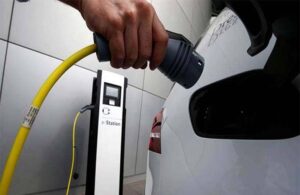Chandigarh Administration has recently approved the draft of its first Electric Vehicle policy.
 The Union Territory of Chandigarh has framed a “Draft Electric Vehicle Policy, 2022” to make Chandigarh a “Model EV City” by achieving one of the highest penetrations of zero-emission vehicles among all Indian cities in five years.
The Union Territory of Chandigarh has framed a “Draft Electric Vehicle Policy, 2022” to make Chandigarh a “Model EV City” by achieving one of the highest penetrations of zero-emission vehicles among all Indian cities in five years.
“The draft of the EV policy will now be kept in the public domain for thirty days for inviting suggestions/comments from all the stakeholders and general public of UT Chandigarh,” an official of the administration stated.
The Chandigarh Electric Vehicle Policy has the provision to incentivize the adoption of all vehicle categories such as e-bicycles, electric two-wheelers, e-carts, e- autos, e-goods carriers (L5N and N1), electric four-wheelers (personal and commercial) which is over & above FAME-II policy incentives provided by the Government of India.
The policy will only be applicable to those electric vehicles which are purchased and registered in Chandigarh.
In addition to this, a special early bird Incentive is also being provided to all e-vehicles that are purchased and registered in the first year of the policy period.
The Chandigarh Electric Vehicle Policy will also help in creating public charging infrastructure in every sector and aims in the first two years to have 100 such public charging stations installed in the Union Territory.
To encourage people to buy electric vehicles, the administration in the policy has tried to weave in features that motivate people to learn about vehicles that operate electrically. The administration in the policy has decided to waive the registration fee for e-vehicles. The e-vehicles are already exempted from road tax in Chandigarh till 2024.
The policy specifies a 100 percent waiver on parking charges at Chandigarh Municipal Corporation-run parking lots for five years for all e-vehicles of the UT.
Also, there will be incentives of Rs 5,000 per kilowatt for buyers of electric two-wheelers subject to a maximum of Rs 30,000; Rs 10,000 per kilowatt for registered owners of electric cars subject to a maximum of Rs 1,50,000 (which was earlier Rs 75,000).
Besides, for the purchase of electric three-wheelers, including e-rickshaws, e-carts, and e-autos, an incentive of Rs 30,000 will be given.
The draft policy also suggests that registration of fossil-fuel-based (like petrol and diesel) two-wheelers and three-wheelers will be capped every year.
Four-wheelers will be phased out in a phased manner due to the limited availability of options in terms of models and price range.
